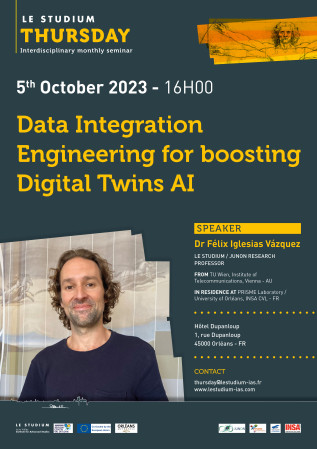Félix Iglesias Vázquez
From
TU Wien, Institute of Telecommunications, Vienna - AU
In residence at
PRISME Laboratory / University of Orléans, INSA CVL - FR
Host scientist
Frédéric Ros
BIOGRAPHY
Félix Iglesias Vázquez was born in Madrid, Spain, in 1980. He received the Ph.D. degree in technical sciences from TU Wien, Vienna, Austria, in 2012. He currently holds a Senior Scientist position at TU Wien. He has worked on fundamental research and project development for several Spanish and Austrian firms, and lectured in the fields of electronics, physics, automation, data analysis and network security. His research interests include mainly artificial intelligence, machine learning and data analysis.
PROJECT
Development of digital twin software prototypes and validation of communication protocols
The JUNON ARC CVL programme aims to build digital twins and to design digital services to improve the monitoring and understanding of the environment for a better management of natural resources (soil, water, atmosphere). The ambition is to place environmental and digital research at the heart of the regional innovation strategy and to bring useful data and services to multiple socio-economic partners.
The primary objective of this project is to develop prototypes for various digital twins as part of the JUNON ARD CVL programme focusing on software design pertaining to architecture, user interface (HMI), and communication protocols. These digital twins will be interconnected with a software brick dedicated to data management. For each digital twin, a computer prototype will be created based on a standard interface that will be replicated across all digital twins and using alternative programming language options (Python or C++.) An iterative approach will ultimately lead to a more robust and reliable system, ensuring a seamless integration of the digital twins with the data management infrastructure. Inside each digital twin, the modelling of each usage will be accomplished through a "black box" approach. This scheme involves encapsulating internal workings and complexities of each use within a self-contained module. The "black box" module will be refined, developed, and seamlessly integrated into the system. An initial phase will focus on the data format analysis, data extraction and data conversion and pre-processing leading to the development of the software components and the definition of the architecture.
The overall objective is that the digital twins can efficiently interact with the central components of the system, abstracting the implementation details while ensuring smooth communication and cooperation among different parts of the architecture.


